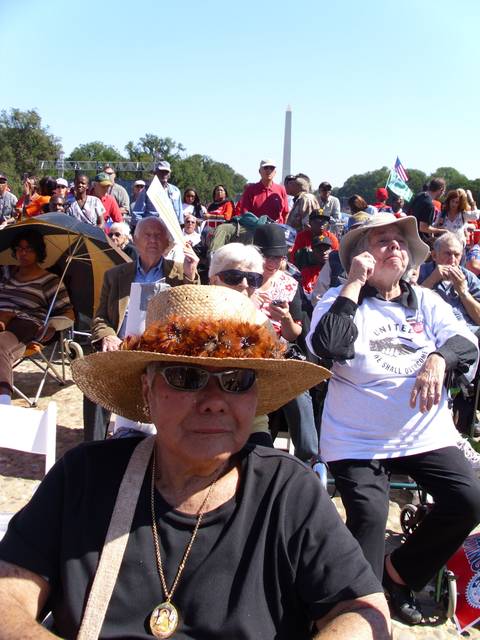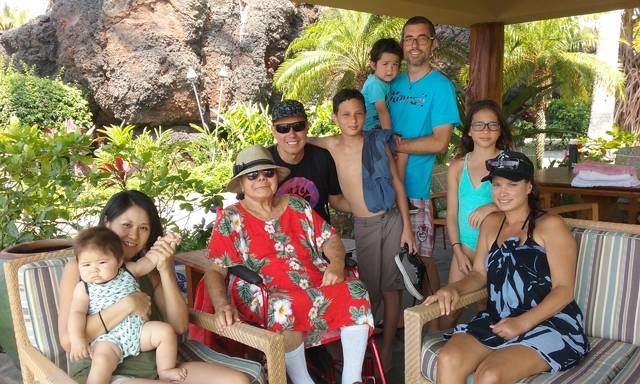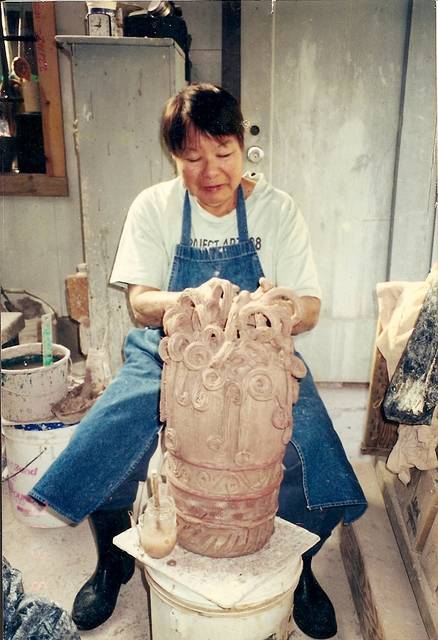Community leader Fumi Bonk leaves a lasting legacy in Waimea, across the state of Hawaii


Fumi Bonk poses with her grandchildren and great-grandchildren. (Keiko Bonk/Courtesy Photos)

Fumi Bonk, a longtime community member in Kohala, died in January. She left a lasting legacy on Hawaii Island, and in the state political sphere. (Keiko Bonk/Courtesy Photo)

Fumi Bonk, a longtime community member in Kohala, died in January. She left a lasting legacy on Hawaii Island, and in the state political sphere. She helped produce the Waimea Cherry Blossom Heritage Festival, an annual event in Waimea. (Keiko Bonk/Courtesy Photo)
KAILUA-KONA A community leader on Hawaii Island, and a behind-the-scenes political leader across the state, Fumie Fumi Bonk is best remembered by her family and friends as a woman with drive and grit.
KAILUA-KONA — A community leader on Hawaii Island, and a behind-the-scenes political leader across the state, Fumie “Fumi” Bonk is best remembered by her family and friends as a woman with drive and grit.
“She would always say, ‘Let’s go kick some butt,’ whether it was on a campaign or with art or with music,” said her daughter, politician and artist Keiko Bonk.
Fumi Bonk died Jan. 27, 2019, at her daughter’s home in Kaimuki, Oahu. She was born Dec. 17, 1923, on her parents’ farm, Waialae Nui Dairy, in Honolulu, the sixth of 10 children. Although she was born on Oahu and spent her later years on the island, she spent a significant portion of her life, 33 years, in the Kohala region of Hawaii Island, and brought her community and activist spirit with her.
“She was really supportive of the arts in Waimea,” Keiko Bonk said. “For example, she held art shows and pulled people to put art in auctions for the benefit of the North Hawaii Community Hospital.”
Fumi Bonk had a significant role in the Kohala community, but it is the cherry blossoms that will carry on her greatest legacy in Waimea. Bonk, along with her friend Emiko Wakayama, helped co-produce the annual Waimea Cherry Blossom Heritage Festival, which began in 1994.
“The vision that both of my parents had was to make the place so beautiful that people would want to come, and thus, helped support the Cherry Blossom Festival,” Keiko Bonk said of her mother and her father, Bill.
The festival is held every February celebrating the 1953 arrival of the first three cherry blossoms in Waimea. The trees were given to the community to commemorate Fred Makino, founder of Hawaii Hochi, the first Japanese language newspaper in Hawaii.
Kohala resident James Tohara was the mastermind behind the festival, and community members such as Fumi Bonk, Wakayama, and Department of Parks and Recreation Director Roxcie Waltjen helped the festival come to fruition.
Last month, the 26th annual festival was celebrated, and Keiko Bonk said the festival has grown exponentially since it was established. Her mother, however, still felt there was work to be done.
“She was hoping that there would be more ambition to plant more cherry blossoms. She was always giving credit to the birds more than the people,” Keiko Bonk said on the spread of the trees in Waimea. “She also had a larger vision. She always thought that cherry blossoms would light up the whole island, and there would be more festivals revolving around beauty and flowers.”
Described by her family as a brutally honest person with a good sense of humor, Fumi Bonk is known away from Hawaii Island as the wife of William “Bill” Bonk, a University of Hawaii archaeologist and political organizer who worked to elect many of Hawaii’s elected officials and was a major contributor to the Democratic Party of Hawaii.
Fumi Bonk worked as a campaign organizer for county, state and federal offices. Fumi and Bill Bonk also backed Keiko Bonk in creating the Green Party of Hawaii.
Keiko Bonk said her mother was the one who often pushed her husband, and other people, toward their goals.
“She was driven, sometimes moving too fast for a lot of people she wanted to help,” Keiko Bonk said. “She was a great organizer. Other people with visions would get ideas but sometimes they couldn’t enact them. But my mother was action-oriented, like my father was a very idea-oriented person. I think if he didn’t have my mom, a lot of his ideas would have stayed in academia.”
Fumi Bonk was more than just a campaign organizer and a force behind the Hawaii community. She was also a ceramic artist, poet, Department of Education art and science teacher, farmer, union organizer, patron of the arts, and assistant to her husband on many archaeological expeditions.
Bonk’s ceramic sculptures and her ceramic vessels are in the State Foundation on Culture and the Arts collection, as well as in private collections throughout Hawaii, the mainland and Japan. In the late 1960s, Bonk created the Big Island Artists Guild.
She was family oriented, and the mother of three children — Keiko, Seizen and Ken, who were all raised on Hawaii Island — and a grandmother and great-grandmother.
“She really loved her kids, her friends, and her grandchildren,” Keiko Bonk said. “She was a real family woman.”
A celebration of life for Fumi Bonk will be held at noon on Saturday, March 16, at Honokaa Hongwanji Buddhist Temple. Community members who wish to attend are encouraged to do so, and more information on her memorial can be found by calling 938-6888.
Keiko Bonk contributed to this report.


